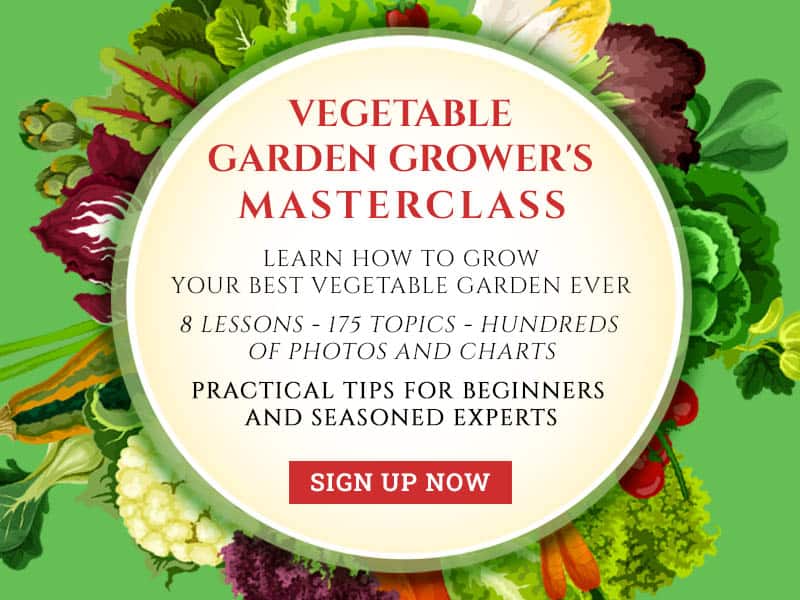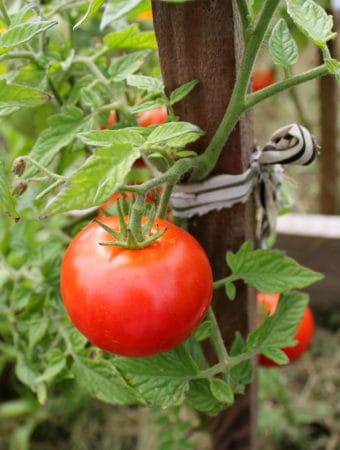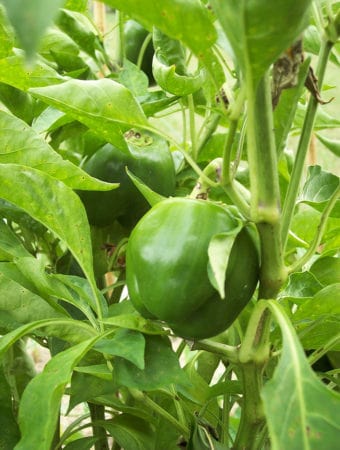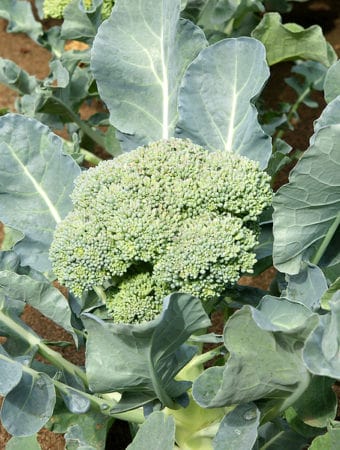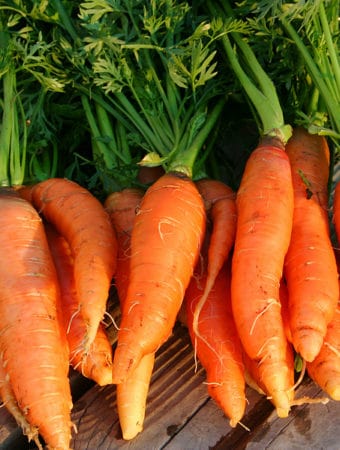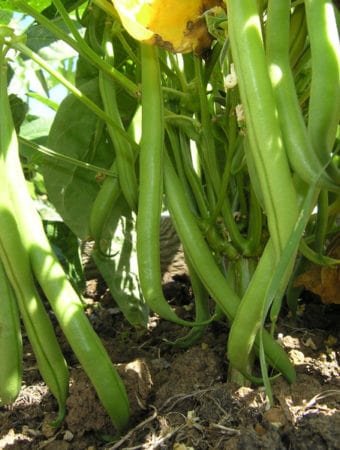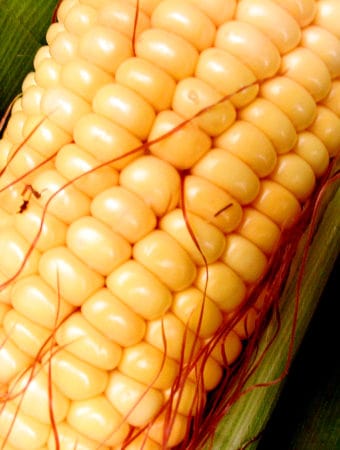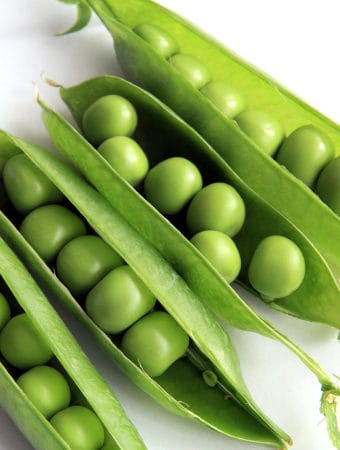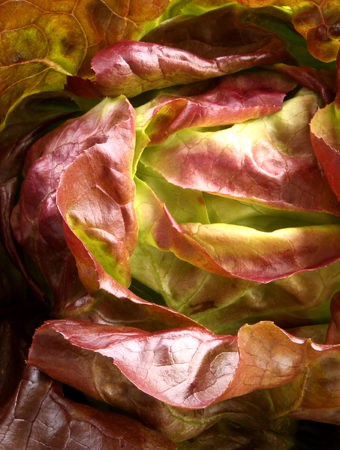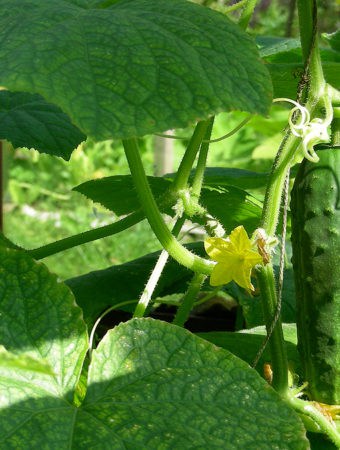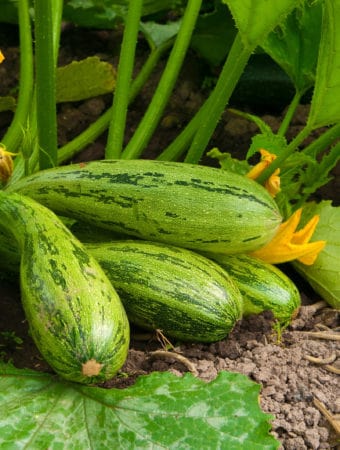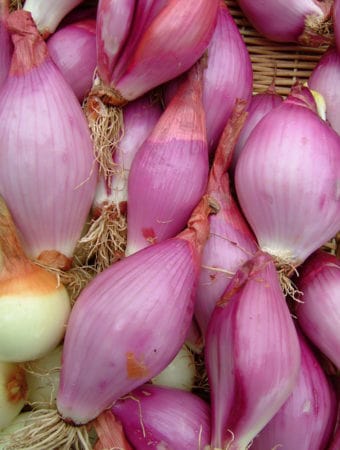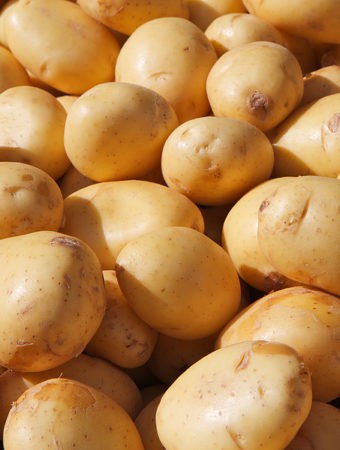Mulching can benefit your vegetable garden. Mulch is any material laid on the surface of the soil. Mulch protects the soil surface and allows air and water through. It can be organic, such as compost, shredded leaves, or lawn clipping, or inorganic or synthetic, such as coarse sand, gravel, or plastic.
Mulch reduces evaporation from the soil surface, moderates soil temperature, and insulates roots from summer heat and winter cold. Mulch suppresses weeds, reduces soil compaction, prevents erosion, and adds organic matter to the soil.
Organic mulches–mulches derived from plant materials–not only protect the soil but add nutrients over time while enriching overall soil composition.
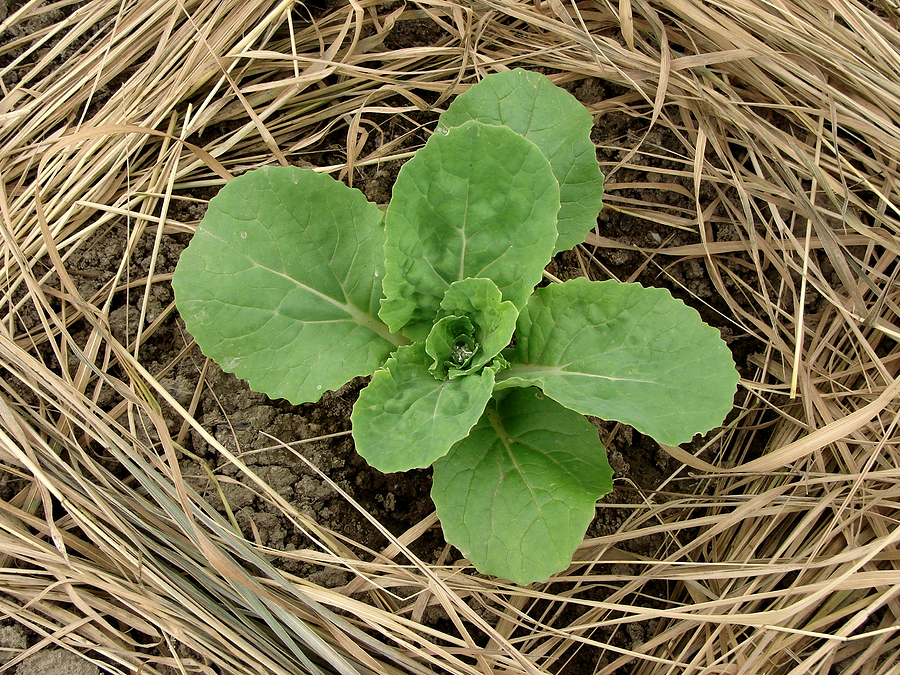
During the growing season, mulch can slow evaporation, inhibit and control weeds, and regulate soil temperature. In winter, mulch can protect perennial plants and the soil.
Not every mulch is right for every vegetable crop. Warm-weather crops such as peppers and tomatoes will benefit from plastic mulch which can help warm the soil in spring and later protect them from splashing soil. Cool-weather crops such as lettuce and cabbage will benefit from organic mulches which are water permeable and moisture retentive and keep the soil cool.
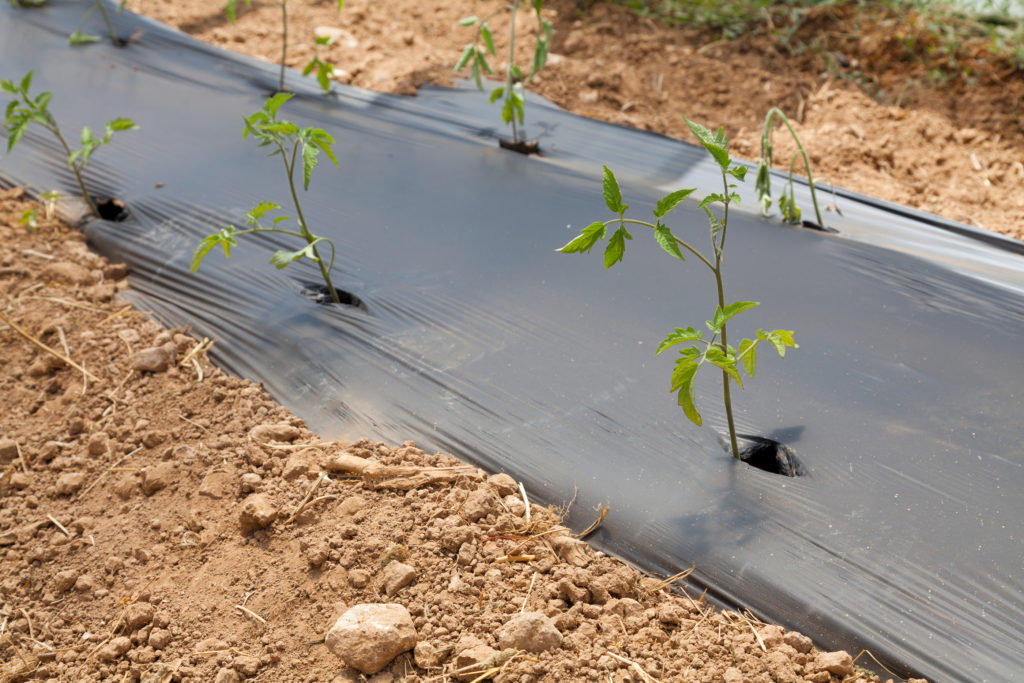
Benefits of mulching
Conserve soil moisture
Mulch conserves soil moisture by covering the ground and decreasing water loss through evaporation.
Improve soil structure
Mulch improves soil structure by preventing erosion, compaction, and crusting. Soil erosion is decreased as the impact of heavy rainfall is reduced by mulch. Water is allowed to slowly infiltrate the soil; puddling and crusting can occur as the result of heavy rainfall or irrigation. Mulching reduces compaction when the soil is walked on and protects plant roots and earthworms allowing them to continue their work.
Control weeds
Mulch controls weeds by making conditions unfavorable for the germination of weed seeds. Mulch provides a physical barrier for emerging weeds. A thick layer of organic mulch will reduce annual weeds. Mulch reduces some perennial weeds and grasses and makes them easier to spot as they emerge. The moisture below the mulch will make weed-pulling easier. Black plastic and newspaper are the best mulch for controlling perennial weeds.
Moderate soil temperature
Mulch moderates soil temperature. Organic mulches such as leaves and grass clippings are loose and insulate the soil keeping it cool. Apply organic mulches late, not early in the season, after the winter chill has left the soil. Synthetic mulches such as plastic will help warm the soil more quickly in spring and increase early plant development. Black plastic or clear plastic will raise the soil temperature by 5°F or more. Plastic is a good choice for protecting warm-season crops.
Add nutrients and humus to the soil
Organic mulches are beneficial to the soil as they decompose; they improve soil tilth and moisture-holding capacity. Organic mulches are best applied after plants are well established and are at least 4 to 6 inches tall. Composted organic materials are rich in plant nutrients such as nitrogen and phosphorus and trace elements–they are not fertilizers but rich soil amendments.
Compost can be used as mulch; add 2 inches of compost to the soil and allow it to work itself into the soil. Uncomposted organic material or plant residue also will benefit the soil but requires 6 weeks or more to decompose. Use uncomposted organic materials as a sheet mulch or top layer and allow it to decompose over the course of the season, or apply it as a top layer in fall to protect the soil through winter. Apply organic mulches where there is already reasonably good soil moisture and before the weather turns hot. Rainwater infiltration is slowed by mulch so it is best not to place mulch over dry soil.
Keep vegetables clean
Mulch keeps vegetable crops clean and reduces exposure to disease. Mulch prevents soil from splashing and prevents vegetables from contact with the soil. Many soilborne diseases are spread to plants in splashing soil water during rain or irrigation. Mulch reduces soil and disease particle splashing. To further protect plants, use mulch in combination with stakes and cages to lift plants off the ground. Use drip irrigation to deliver water directly to the base of plants.
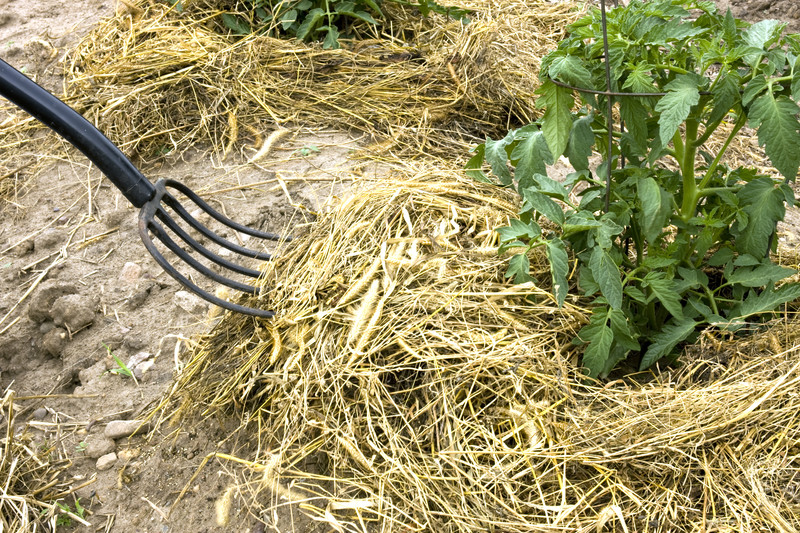
Summer mulching
Mulch in summer and hot weather to protect plant roots and stem soil moisture evaporation. Apply three to four inches of dried leaves or compost or grass clippings or straw around plants at midsummer to protect plants from hot weather and reduce the soil temperature by 10°F or more. Soil temperatures of greater than 85°F/29°C can slow plant growth. The temperature of soil under mulch changes much more slowly.
Mulch protects bare soil from being compacted over time by the drying of soil particles in the sun and the beating of rain or irrigation. A thin layer of mulch will protect soil microorganisms and other beneficial soil-borne organisms from cooking in the summer heat.
Almost all plants benefit from the protection of mulch. Vegetables that most benefits from summer mulching are eggplants, tomatoes, cauliflower, celery, potatoes, currants, and gooseberries. These crops especially appreciate cool, loose, well-drained soil.
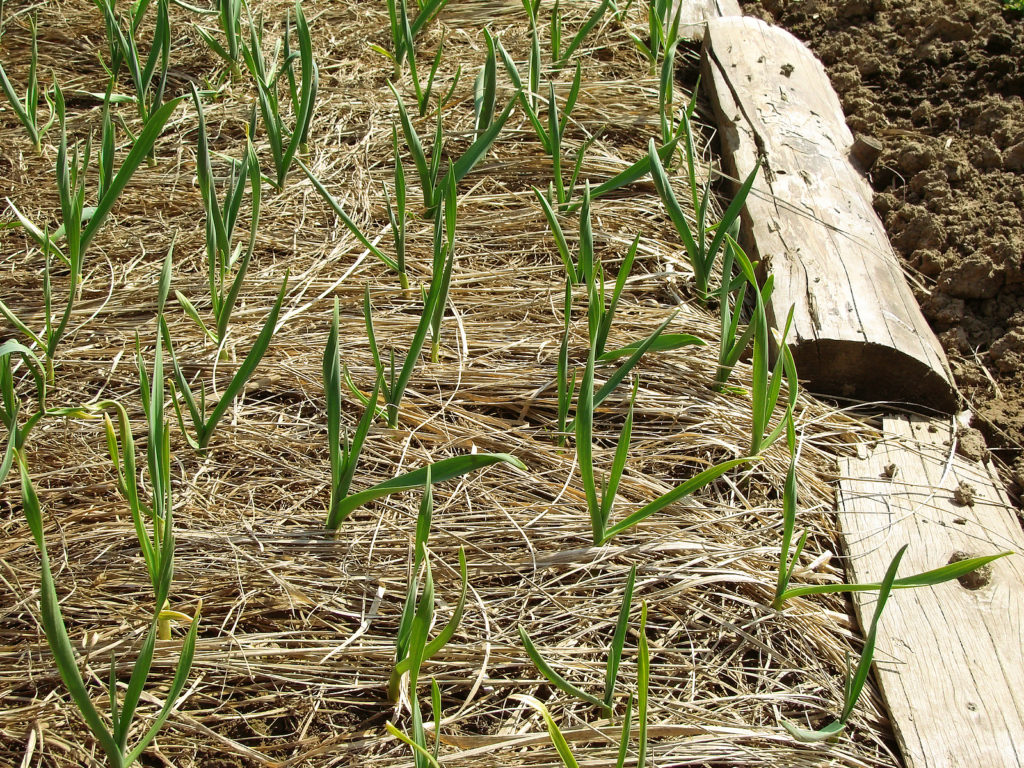
Winter mulching
Winter mulching will protect vegetables and other garden beds from the impact of wind, rain, and snow and prevent the loss of soil nutrients. Mulch for winter can be straw, chopped leaves, aged compost, or a cover crop.
Clearing the garden of debris and weeds and putting mulch in place before winter will make getting the garden re-started in spring easier. When spring arrives, pull the mulch back about two weeks before planting (to allow the soil to warm), loosen the top 4 inches (10cm) of soil, and rake the bed smooth before planting.
Before setting down mulch, do the following:
- Remove annual weeds from the garden; don’t let weeds flower or drop seed.
- Dig out perennial weeds; remove taproots and all creeping roots.
- Clean the garden of spent plants and debris.
- Where the ground freezes, allow the ground to freeze before mulching; this will cut down on soil heaving after a mid-winter thaw.
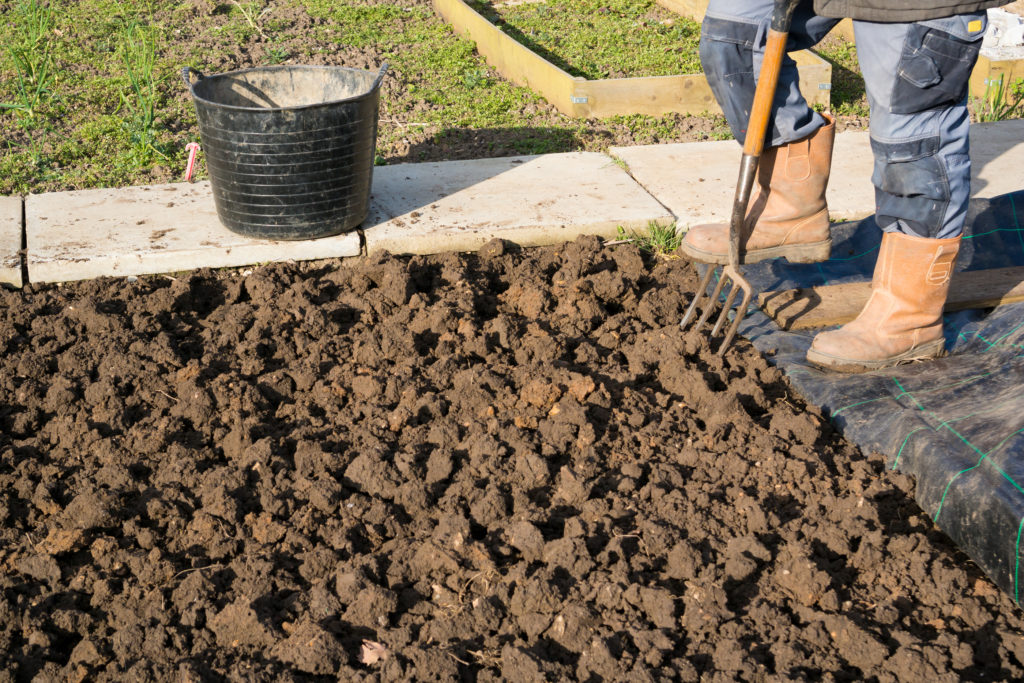
If insects have been a problem the past season, work the soil 6 to 8 inches (15 to 20 cm) and leave it bare for two weeks before mulching, then turn the soil one more time before mulching. This will expose various life stages of insects such as potato beetles, flea beetles, wireworms, June bugs, grasshoppers, onion maggots, and brassica root maggots; the insects will be eaten by birds or die of exposure before you mulch.
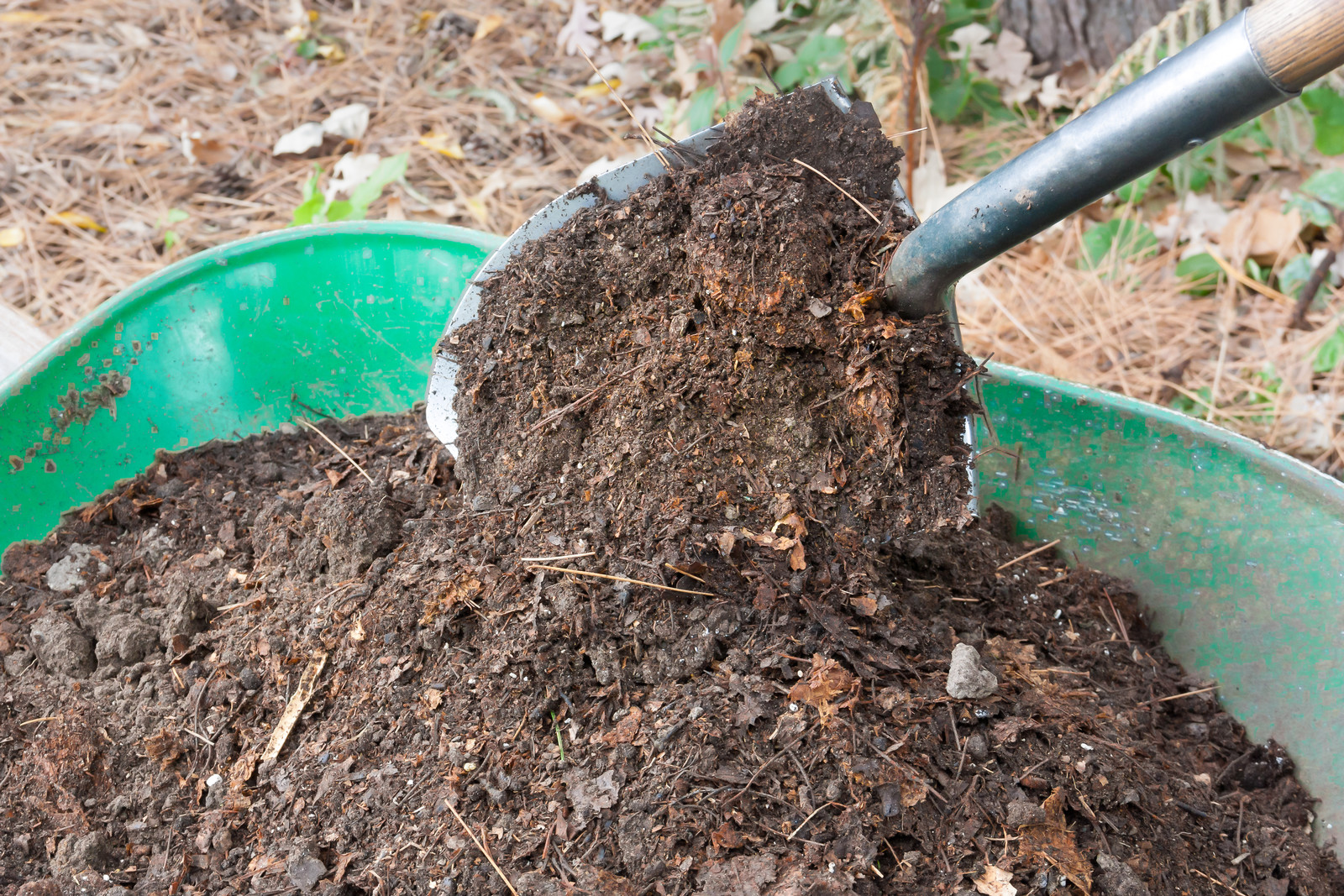
Applying mulch
Two cubic feet (.05 cubic meter) of compost mulch can cover an area of 8 square feet (.7 sq.m.) to 3 inches (7.6cm) deep; one cubic yard of compost mulch covers an area of 108 square feet to 3 inches deep.
Mulch should be applied loosely and not compacted. Mulch should be kept back a few inches from the stems or crowns of plants and trunks of trees. If placed too closely, mulch can retain moisture and cause plant stems and trunks to rot.
Water can be delivered to plant roots through the mulch into the soil. Drips systems set under the mulch will more directly apply water to the root zone.
Mulch can control insects and diseases. Straw mulch can reduce the number of adult cucumber beetles laying eggs at the base of the plants. Mulch reduces or eliminates the spread of fungal spores often spread by the splashing of irrigation water or rain.
Organic mulches
Compost
Decomposed and partially decomposed organic materials. Compost is both a mulch and soil conditioner. A 2- to 3-inch layer of compost will control weeds though not prevent weed growth. Incorporate compost into the soil as an amendment or use it as sheet mulch on top. Also, use for over-wintering beds. Use compost as a feeding mulch.
Loose, aged compost applied as a 2- or 3-inch (5-7.5cm) sheet across the soil will slow soil moisture evaporation and keep roots cool in hot weather. Aged compost adds a wide range of nutrients to the soil and improves soil structure and the retention of soil moisture.
Lawn clippings
Dry grass clippings are the best choice. A 2-inch layer of dry grass clippings is a good will keep down weeds and conserve soil moisture and can be used directly around vegetables and fruit. Do not use grass clippings from a lawn that has been treated with an herbicide or weed killer; herbicide residue can harm or kill vegetables. Avoid fresh or wet grass clippings which will mat and will likely smell bad as they decompose; they can also heat up the soil as they decompose. Avoid grass clippings that contain crabgrass or grass seed heads. Grass clippings add nitrogen to the soil.
Dried and aged grass clippings free of seed or weeds will protect the soil and add nitrogen to the soil as it decomposes. Avoid fresh grass clippings more than ½ inch thick which can mat and decay from the center causing a sour smell and too much heat. Lawn clippings used as mulch should be herbicide- and pesticide-free.
Leaves and leaf mold
Leaves that have been shredded or partially decomposed (leaf mold) will prevent serious soil compaction, conserve soil moisture, and control annual weeds. Use a 2 to 3-inch layer of leaves or 1½ inches of leaf mold. Leaves are high in carbon and will require an under-application of nitrogen to prevent soil nitrogen depletion as they decompose. Leaves that become soggy can form an impenetrable mat; mix leaves with straw or shred them to avoid matting. Do not use walnut leaves; they contain iodine, which is toxic to some vegetable plants. Leaves add nitrogen to the soil. Leaf mold, like compost, is excellent for feeding.
A 4-inch (10cm) layer of dried leaves can cool the soil by as much as 18°F. Raked dried leaves can be shredded by the passing of a lawnmower set at 3-inches high.
Sawdust
Sawdust is good weed control. Sawdust that has been allowed to decompose for a year is best. Fresh sawdust can crust and keep rainfall from reaching the soil. Apply a 2-inch layer of sawdust to control weeds. Add ½ pound of nitrogen per 10 cubic feet of sawdust to prevent nutrient deficiencies caused by microorganisms depleting soil nitrogen as they work to decompose carbon-rich sawdust. A ¼ inch layer of sawdust will help seed staring.
Straw
Use straw as an annual weed control; apply 6 to 8 inches. Straw can be difficult to use in small spaces because it is loose and bulky. Straw can be slow to decompose and dry straw is highly flammable. Avoid straw or hay which contains weed seeds.
Set loosely around plants to 4 inches thick; the straw will protect the soil from the summer heat while allowing water to easily reach planting beds. Straw set under strawberries or summer fruiting vegetables will protect crops from insects, soil splashing, and rots.
Bark, wood chips, or shavings
Bark and wood chips like sawdust decompose slowly and are high in carbon. A 2- to 3-inch layer of bark provides good annual weed control or use as a pathway material. Apply nitrogen to the soil before putting down bark or wood chips as mulch. It is best to let bark decompose for a year before applying it around plants.
Pine needles
Pine needles make long-lasting mulch but can form a soggy mat when wet. Use pine needles around acid-loving plants. A 1- to 1½ inch layer of pine needles will control annual weeds and allow moisture to penetrate the soil. Pine needles are very slow to decompose and inhibit earthworm activity.
Pine needles are effective in keeping rain or irrigation from washing away furrows and raised beds and lightly applied will protect newly seeded rows. Pine needles break down slowly.
Hulls and ground corncobs
These materials will provide fair weed control when applied to a depth of 2 to 4 inches. Hulls–peanut hulls and cocoa hulls–have a tendency to blow in the wind. Add sawdust to improve texture and water retention. Cocoa hulls have a high potash content that can harm plants, and do not apply to a depth greater than 2 inches. Corncobs provide good soil insulation but they can generate heat and should not be used close to tender plant stems.
Peat moss
Use peat moss to a depth of about 1 inch to control annual weeds and grasses. Peat moss is very slow to decompose and provides little or no nutrients to the soil. Pre-moisten peat moss before using it as mulch otherwise it may blow away. Turn peat moss into the soil at the end of the season. Dry peat moss requires considerable time and water to become moist; avoid using peat moss where the weather is very warm or where there is little rainfall. Peat moss has an acid pH; use it with acid-loving plants. Peat moss is harvested from peat bogs and is very slowly renewed. Peat moss is a non-renewable resource and is not sold in many countries.
Living mulch
Vegetable crops closely spaced can form a leafy canopy that acts as a living mulch protecting the soil from the heat of the sun and slowing the evaporation of soil moisture. Crops should be planted so that their leaves just touch or slightly overlap at maturity. Intensively planted crops require fewer square feet. Less unproductive soil is watered. Moisture transpiring from leaves is trapped as humidity below the leafy canopy.
Inorganic mulches
Newspaper
Use newspaper as an under-layer for organic mulches. Use 2 to 4 sheets of newspaper–or heavy cardboard–as a weed control. Newspaper will decompose over the course of a season. Apply nitrogen beneath the newspaper to aid in decomposition; the newspaper is carbon-rich and soil microorganisms will draw on soil nitrogen to decompose the newspaper. Place bark or sawdust on top of the newspaper for a better appearance. Printer’s ink no longer contains lead or other harmful compounds and will not damage the soil or plants.
Four to six sheets of damp black and white newsprint paper will protect the soil and suppress weeds. Newspaper sheets should be applied loosely. Paper is best topped with grass clippings or straw to keep it from drying out. Check to make sure the paper does not absorb irrigation or rainwater.
Black plastic
Black plastic blocks out light so that weeds and grasses cannot get started. One layer of black plastic will control weeds. Weigh down plastic with soil along its edges or stones to keep it from billowing or blowing away. Black plastic absorbs heat and warms the soil by 5 to 10 degrees. Use black plastic to warm the soil in spring, but be aware that black plastic can overheat the soil in warm or hot weather damaging plant roots. Some plastic sheeting is black on one side and white on the other to prevent overheating. As well, solid black plastic will not allow water to penetrate. Use drip irrigation to make sure plants get moisture. Porous plastic–such as commercial weed block–will allow water to enter and gasses to exchange. Plastic is slow to decompose but can be broken down by sunlight; it may need replacing every couple of years.
Clear plastic
Clear plastic is not useful for weed control but will warm the soil in early spring and speed up seed germination. Clear plastic can raise the soil temperature by 10 to 20 degrees. Remove clear plastic after seed germination.
Red plastic and other colored plastic
Research at Clemson University has shown that red plastic can increase the yield of tomatoes and other crops. Red plastic will also conserve soil moisture and control weeds. Red plastic reflects onto plants a higher amount of certain growth-enhancing light waves from sunlight. Other colored plastics will also reflect different light waves. Yellow plastic attracts insects and can be used as a trap.
Landscape fabric and weed barrier mats
These are usually made of plastic or synthetic materials. They can be used in permanent beds and covered with organic mulch. Weed barrier mats need to be weighted down on the ends and sides to keep them in place.
Potential mulch problems
Rough-textured mulch can harbor slugs, snails, or sow bugs and should be kept back from vegetable crops.
Related articles:
Organic Fertilizers and Soil Amendments
Garden Planning Books at Amazon:
- Vegetable Garden Almanac & Planner
- Kitchen Garden Grower’s Guide Vegetable Encyclopedia
- Vegetable Garden Grower’s Guide
- Tomato Grower’s Answer Book

